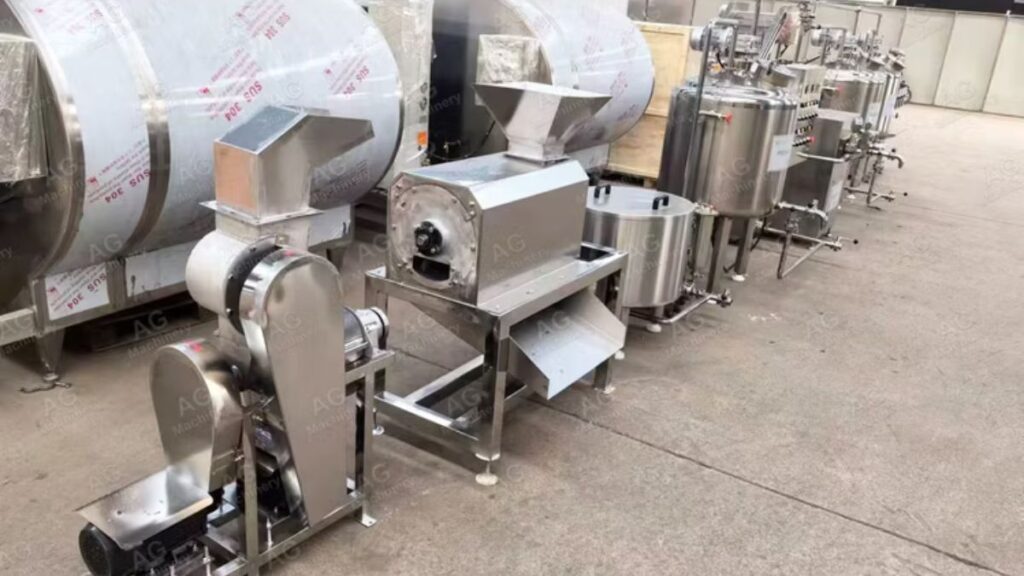The global demand for fruit juice continues to grow as consumers seek healthier beverage choices and businesses explore profitable opportunities in the food and beverage sector. Whether you are a startup looking to enter the juice market or an established company planning to expand operations, choosing between a small-scale juice production line and an industrial juice production line is a critical decision. The right choice impacts your budget, production efficiency, product quality, and long-term growth potential.
In this article, we’ll explore the differences, benefits, challenges, and best use cases of both small-scale and industrial juice production lines to help you determine which option is best suited for your business needs.
Understanding Small-Scale Juice Production Lines
Small-scale juice production lines are designed for startups, small businesses, and niche producers. These lines typically focus on limited daily output, often ranging from 100 liters to 1,000 liters per day, depending on the configuration.
Key Characteristics of Small-Scale Lines
- Lower Capacity: Ideal for small batches or local distribution.
- Compact Design: Machines are smaller and require less space, often fitting into modest facilities.
- Flexibility: Easier to switch between different types of fruit juices.
- Manual or Semi-Automatic Operations: Some stages, like washing or filling, may involve operator assistance.
- Affordable Investment: Entry-level cost makes it attractive for new entrepreneurs.
Advantages
- Lower Initial Investment: Makes juice production accessible to small businesses and startups.
- Product Testing & Market Entry: Allows entrepreneurs to test new juice recipes before scaling up.
- Quick Setup: Easy to install and operate without requiring highly skilled staff.
- Customization: Suitable for businesses that want to produce seasonal or specialty juices.
Limitations
- Limited daily output may not meet high-volume demand.
- Less automation means higher labor costs per unit.
- Expansion often requires reinvestment in larger equipment.
Understanding Industrial Juice Production Lines
Industrial juice production lines are built for large-scale commercial juice manufacturers and beverage companies. With capacities ranging from 5,000 liters to over 50,000 liters per day, they are designed to produce juice continuously and efficiently.
Key Characteristics of Industrial Lines
- High Capacity: Capable of producing thousands of bottles or cartons daily.
- Automation: Fully automated systems handle washing, extraction, pasteurization, filling, labeling, and packaging.
- Advanced Technology: Includes features like aseptic filling, homogenization, and automated cleaning systems (CIP).
- Robust Infrastructure: Requires significant space, utilities, and skilled operators.
- Long-Term Investment: Higher cost but delivers economies of scale.
Advantages
- High Efficiency: Produces large volumes with minimal manual intervention.
- Consistency in Quality: Automated processes ensure uniform taste, texture, and safety.
- Lower Unit Cost: Large-scale production reduces cost per liter over time.
- Scalability: Meets the demands of regional, national, or even international markets.
Limitations
- High Initial Cost: Requires significant capital investment.
- Complex Setup: Installation and training take time and expertise.
- Less Flexibility: Switching between different juice products is more complex.
Comparing Small-Scale vs. Industrial Juice Production Lines
1. Production Capacity
- Small-scale: Suitable for microbreweries, cafes, or local juice brands with limited demand.
- Industrial: Ideal for large companies distributing juice to supermarkets and export markets.
2. Cost of Investment
- Small-scale: Budget-friendly, often starting at a few thousand dollars.
- Industrial: Capital-intensive, often requiring hundreds of thousands to millions of dollars.
3. Target Market
- Small-scale: Local markets, farmers’ markets, health stores, juice bars.
- Industrial: Large retailers, wholesale distributors, global beverage brands.
4. Product Variety
- Small-scale: Easier to experiment with different fruits and flavors.
- Industrial: Focuses on high-demand products with consistent recipes.
5. Labor & Automation
- Small-scale: Relies more on human labor and supervision.
- Industrial: High automation reduces labor costs but requires technical staff.
6. Return on Investment
- Small-scale: Faster break-even for niche markets.
- Industrial: Long-term profitability through mass production.
Who Should Choose Small-Scale Juice Production Lines?
- Startups and Entrepreneurs: Testing new business ideas.
- Small Businesses: Local juice producers, cafes, or restaurants.
- Niche Markets: Organic, seasonal, or cold-pressed juice brands.
- Limited Budgets: Companies not ready for large-scale investment.
Small-scale lines are perfect for businesses focusing on quality over quantity and building a brand identity in local markets.
Who Should Choose Industrial Juice Production Lines?
- Established Beverage Companies: Expanding operations or entering new markets.
- Export-Oriented Producers: Companies targeting international markets.
- High-Demand Areas: Regions with significant consumption of packaged juice.
- Long-Term Investors: Businesses prepared to make large investments for future returns.
Industrial lines are ideal for businesses aiming for mass production, efficiency, and profitability in competitive global markets.
Factors to Consider Before Deciding
- Business Goals: Are you focusing on local niche markets or aiming for global distribution?
- Budget: How much capital are you ready to invest initially?
- Production Volume: Estimate your demand forecast for the next 5–10 years.
- Facility Size: Do you have the space and infrastructure for large-scale equipment?
- Regulatory Requirements: Consider food safety, hygiene, and export regulations.
- Scalability: Will your chosen line allow easy upgrades in the future?
Conclusion
Choosing between a small-scale and an industrial juice production line ultimately depends on your business size, budget, and long-term goals. Small-scale lines are perfect for new businesses testing the waters and targeting niche markets, while industrial lines are best for companies aiming for mass production and international distribution.
Before making your decision, assess your market potential, budget, and operational capacity. With the right choice, your juice production line can become the backbone of a profitable and sustainable business.
FAQs
1. What is the main difference between small-scale and industrial juice production lines?
The key difference lies in capacity and automation. Small-scale lines produce limited batches with more manual work, while industrial lines are fully automated and designed for high-volume, continuous production.
2. How much does it cost to set up a small-scale vs. industrial juice production line?
A small-scale juice line can start from a few thousand dollars, while industrial juice production lines often require investments from hundreds of thousands to millions of dollars, depending on capacity and technology.
3. Can I start with a small-scale line and later upgrade to industrial production?
Yes. Many businesses begin with small-scale lines to test the market, then reinvest profits into larger industrial equipment as demand grows. Planning for scalability from the start makes this transition smoother.






